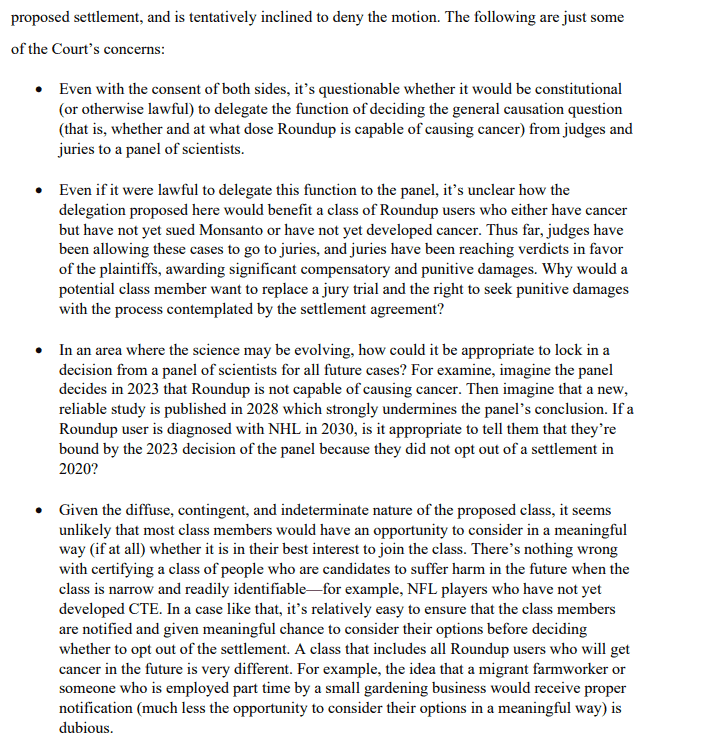A federal judge on Monday had harsh words for Bayer AG’s plan to delay potential future Roundup cancer lawsuits and block jury trials, criticizing the highly unusual proposal crafted by Bayer and a small group of plaintiffs’ attorneys as potentially unconstitutional.
The “Court is skeptical of the propriety and fairness of the proposed settlement, and is tentatively inclined to deny the motion,” reads the preliminary order issued by Judge Vince Chhabria of the U.S. District Court for the Northern District of California. The judge’s position appears to be a sharp blow to Bayer and the company’s efforts to resolve a legacy of litigation attached to Monsanto, which Bayer bought two years ago.
More than 100,000 people in the United States claim exposure to Monsanto’s glyphosate-based Roundup herbicides caused them to develop non-Hodgkin lymphoma (NHL) and that Monsanto long knew about and covered up the cancer risks.
Three jury trials have been held in the last two years and Monsanto lost all three with juries awarding more than $2 billion in damages. All the cases are now on appeal and Bayer has been scrambling to avoid future jury trials.
Last month Bayer said it had reached agreements to settle the majority of lawsuits currently filed and had crafted a plan for handling cases that likely would be filed in the future. To handle the current litigation Bayer said it will pay up to $9.6 billion to resolve roughly 75 percent of the current claims and will continue working to settle the rest.
In the plan for handling potential future cases, Bayer said it was working with a small group of plaintiffs’ attorneys who stand to make more than $150 million in fees in exchange for agreeing to a four-year “standstill” in filing cases. This plan would apply to people who may be diagnosed in the future with NHL they believe is due to Roundup exposure. In contrast to Monsanto’s settlement of the pending cases against it, settlement of this new “futures” class action requires court approval.
In addition to delaying more trials, the deal calls for the establishment of a five-member “science panel” that would take any future findings on cancer claims out of the hands of juries. Instead, a “Class Science Panel” would be established to determine whether Roundup can cause non-Hodgkin lymphoma, and if so, at what minimum exposure levels. Bayer would get to appoint two of the five panel members. If the panel determined there was no causal connection between Roundup and non-Hodgkin lymphoma then the class members would be barred from future such claims.
Several members of the lead law firms who won the three Roundup cancer trials oppose the proposed class action settlement plan, saying it would deprive future plaintiffs of their rights while enriching a handful of lawyers who have not previously been at the forefront of the Roundup litigation.
The plan requires the approval of Judge Chhabria, but the order issued Monday indicated he does not plan to grant approval.
“In an area where the science may be evolving, how could it be appropriate to lock in a
decision from a panel of scientists for all future cases?” the judge asked in his order.
The judge said he will hold a hearing on July 24 on the motion for preliminary approval of the class action settlement.”Given the Court’s current skepticism, it could be contrary to everyone’s interest to delay the hearing on preliminary approval,” he wrote in his order.
Below is an excerpt of the judge’s order:










